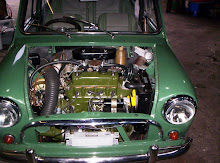An engine manufacturer must necessarily choose a type of plug which is suitable for "normal" or average service; but this does not mean that the recommended grade will be suitable in every case. For example, the owner who indulges in continuous high¬speed driving may find that the normal grade of plug has a tendency to overheat, causing pinking, misfiring at full throttle and rapid burning of the electrodes. The same may apply, to a lesser degree, if long spells of driving in low gear are indulged in when climbing mountain passes. A "cooler" grade of plug which is able to withstand the greater amount of heat developed under these conditions is the obvious answer—possibly a "sports" plug if the engine has been modified or if a tuning kit has been fitted (see page 139).
Much "local" driving, on the other hand, entailing frequent stopping and starting and comparatively long periods of running during which the engine does not become fully warmed up, may cause excessive carbon deposits on the plug insulators, indicating the need for a "hotter" grade of plug which will burn off these deposits. This also applies if the engine is worn and an excessive amount of oil is reaching the combustion chambers. A "hotter" plug can also be fitted when high-octane fuels are used.
The recommended grade of plug can be ascertained by consulting the lists issued by the plug manufacturers. Taking for example three of the most popular makes, we have the following selection, which covers all models except the Mini-Cooper "S" (see page 144)—
Normal grade Hotter plug "Colder" plug
Champion N5 N8 N3
Lodge HBLN CLNH 2HLN
K.L.G. FE70 FE50 FE80
Remember, a "hotter" plug should be used to cure fouling and oiling-up and a "colder" plug to prevent overheating, pre-ignition and rapid burning of the electrodes—but remember, too, that a change of plug may not be the true answer if the real trouble lies in an engine or carburation fault.
Sunday, 11 October 2009
Choosing the Correct Plug
Posted by Info Mini Cars at 11:51
Subscribe to:
Post Comments (Atom)


0 comments:
Post a Comment